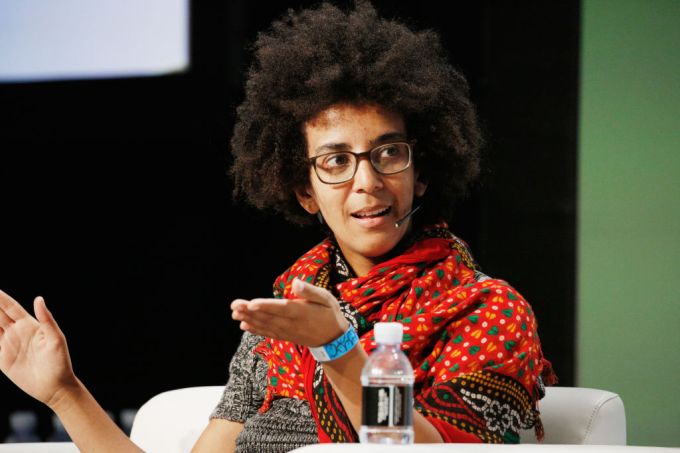This was quite the week for Pinterest and not in a good way. While the company settled the gender discrimination lawsuit brought forth by its former COO, the hefty $22.5 million settlement highlighted some of the tech industry’s inequities.
Meanwhile, Airbnb outlined some new goals around diversity and inclusion, despite having not produced a diversity report since last year, when it disclosed its 2018 data.
All that and more in this week’s edition of Human Capital. Sign up here to get this newsletter in your inbox every Friday at 1 p.m. PT.
Pinterest settles gender discrimination lawsuit for $22.5 million
Pinterest announced it had settled the gender discrimination lawsuit brought forth by former COO Francoise Brougher. In August, Brougher sued Pinterest, alleging gender discrimination, retaliation and wrongful termination.
As part of the settlement, Pinterest will pay $20 million to Brougher and her attorneys, and both Pinterest and Brougher will commit $2.5 million toward “Advancing women and underrepresented communities” in the tech industry, the company wrote in a filing.
On Black women laying “the groundwork for someone else to swoop in and collect ‘progress’”
Before Brougher filed suit against Pinterest, former Pinterest employees Ifeoma Ozoma and Aerica Shimizu Banks publicly alleged racial and gender discrimination while working at the company. I spoke with Ozoma and Banks about the settlement and how it compared to their outcomes.
On a call with TechCrunch earlier this week, Ozoma and Banks described a double standard in their experiences compared to Brougher’s. While Brougher received a $20 million payout, Ozoma and Banks received less than one year’s worth of severance. Here are some pertinent words they shared on the settlement:
Banks:
This follows the time-honored tradition in America where Black women come forward, blazing a trail, revealing injustice and white women coming in and reaping all the benefits of that.
Ozoma:
So we, like in many, many, many other cases, Black women put ourselves on the line, shared absolutely everything that happened to us, then laid the groundwork for someone else to swoop in and collect ‘progress. No progress has been made here because no rights have been made with people who harm has been done to.
Pinterest agrees to adopt DEI recommendations
Pinterest committed to adopting the recommendations from its special committee of the board of directors. The committee formed earlier this year in June, shortly after two former employees, Ifeoma Ozoma and Aerica Shimizu Banks, went public with their allegations of racial and gender discrimination while working at Pinterest.
Here are a few of those recommendations:
- mandatory unconscious bias training for every employee, including managers and executives
- offer additional trainings on inclusivity and unconscious bias
- include “diverse employees” in interview panels with job candidates
- reward employees for their efforts to support and promote DEI
- publish a diversity report twice a year for at least two years; after two years, publish the report annually
- establish criteria for promotion eligibility
- enhance Pinterest’s harassment and discrimination policy
- create a centralized workplace investigations team to ensure consistent and fair outcomes
Gig workers are ready for battle as we enter the new year
Over on Extra Crunch, I did a deep dive into what’s next for gig workers and companies in light of the passage of Prop 22.
The gist is that Prop 22 does not mark the end of the battle of the status of gig workers. Companies are looking to pursue similar legislation in other places while gig workers are gearing up for another battle.
Moving forward, it’s hard to predict where companies like Uber and Lyft will go next, Brian Chen of the National Employment Law Project said, but it’s likely they’ll want to go to big markets.
“Places where they know there’s been on-the-ground workers organizing and activists they’d finally like to stomp out, and where enforcement has been strong against the company,” he told TechCrunch.
Chen pointed to New York, Illinois, Massachusetts, New Jersey, Colorado, Pennsylvania, Washington, Oregon and Michigan. Wherever these companies bring the battle next, Chen says NELP will be heavily involved in fighting back. As will workers.
“We already know companies are doing this proactively, so we need to be doing this proactively as well,” Bain told me. “I think there is a lot we are going to be up against. It depends on some of the people who are appointed in labor positions and what their actual principles and values are, but I’m a little more optimistic. Things that were not possible to do under Trump will just be really difficult to do under Biden, but not impossible.”
You can read the full, 2,318-word story here.
Gig Workers Rising to launch app to help workers understand their rights under Prop 22
Gig Workers Rising is gearing up to release an app to help gig workers understand their new rights and benefits under Prop 22.
“[…] workers know that gig companies have a history of making and breaking promises to workers,” the site states. “These corporations depend on you not knowing your rights and being unable to advocate for the benefits you are owed.”
Earlier in the week, Lyft outlined the benefits that are now available to drivers.
Airbnb sets new DEI goals
Airbnb, which recently went public and became a $100 billion company, recently set two goals to try to improve diversity at the home-sharing and experiences company because it “is nowhere near satisfied with the status quo,” the company wrote in a blog post.
By the end of 2025, Airbnb is aiming for 20% of its U.S. workforce to be underrepresented minorities, which includes folks who self-identify as American Indian or Alaska Native, Black or African American, Hispanic or Latinx, Native Hawaiian or Other Pacific Islander. Currently, underrepresented minorities make up just 12% of the company’s employee base.
The second goal is to increase the representation of women to 50% by the end of 2025.
Intel’s diversity report breaks out underrepresented women data for first time
Some highlights from the report:
- Representation of Hispanic employees increased from 10% to 10.5% year over year
- Representation of underrepresented minorities in the exec level decreased to 8.4% from 8.8%
- Underrepresented women in exec roles increased from 1.8% to 2.4%
TechCrunch Sessions: Justice 2021 tickets on sale
Lastly, tickets are now available for TC Sessions: Justice 2021. Don’t worry, it’ll be an entirely virtual event and tickets are just $5 a pop.
The event is taking place from your living room on March 3, 2021. Already, we’ve lined up speakers like Backstage Capital founder and Managing Partner Arlan Hamilton, Kickstarter Union co-organizer Clarissa Redwine and Ethel’s Club/Somewhere Good founder and CEO Naj Austin.
More to come!



